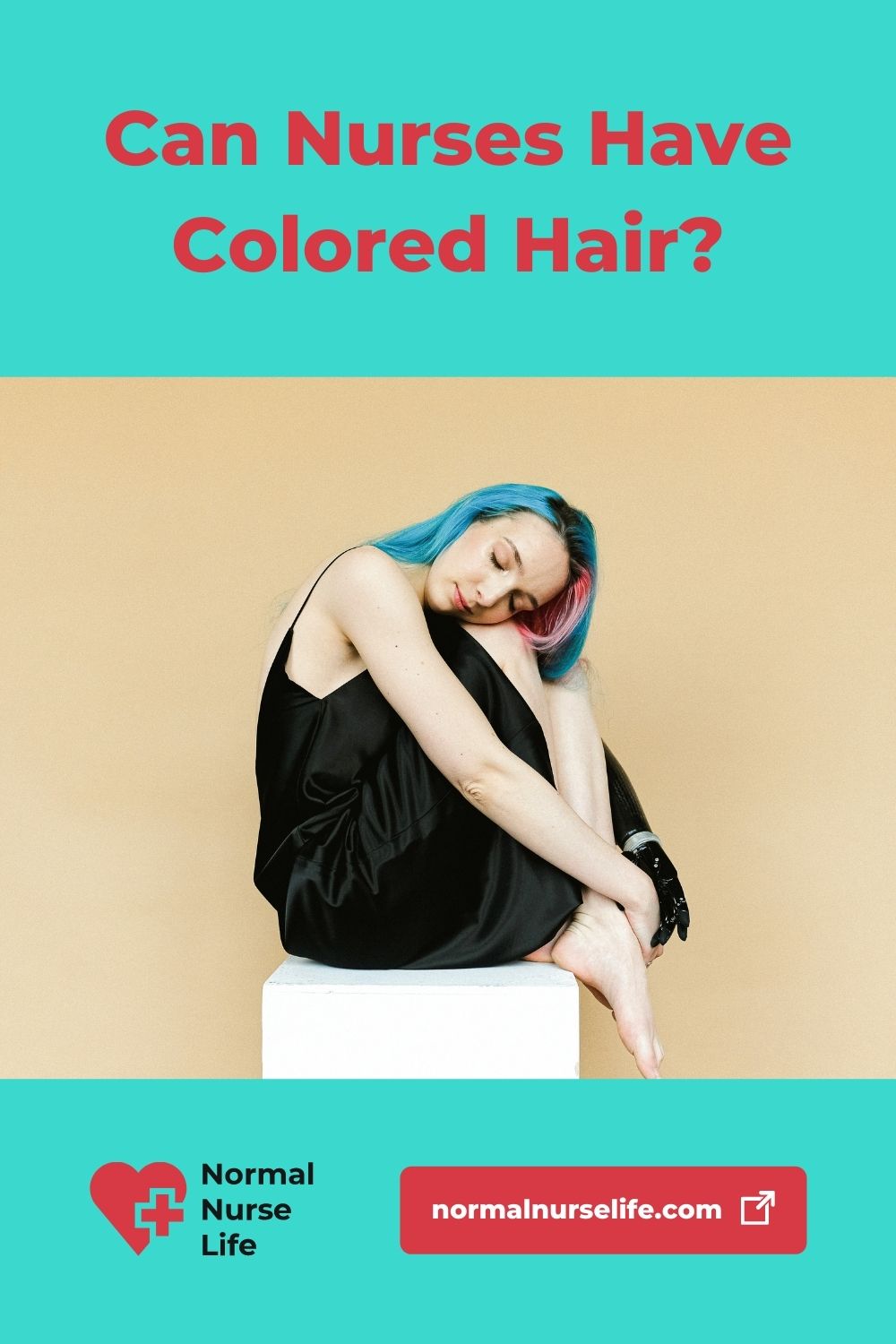As crucial members of any healthcare team, nurses have to abide by a certain set of work rules and a code of conduct so they can do their jobs well.
We’re an affiliate
As an Amazon Associate, I earn from qualifying purchases. Thank you if you use our links, we really appreciate it! 🙂
Can nurses have colored hair?
This includes having to follow restrictions on what they can wear while at work, which may involve changing how they wear or color their hair.
Read on to know why this is so and how the nursing profession is slowly adapting policies to become more inclusive of nurses and students who use hair color as a form of self-expression.
Pin me on Pinterest!

Table of Contents
Can nurses dye their hair?
The general answer is no.
Most hospitals do not allow nurses to come to work with dyed or colored hair.
Most hospitals, clinics, and health institutions often have this clearly laid out as company policy as a prohibition on ‘unnatural hair color.’
Policies like these have also been fairly common in the past decades partly as a way to ensure that nurses exude an image that is trustworthy and professional.
See also: How Can Nurses Influence Policy?
However, many hospitals and institutions have started to relax on hair coloring policies in recent years.
Stemming from the fact that public perception regarding how appearance is linked to job performance is also starting to shift.
More and more hospitals have begun to adopt more relaxed policies on hair color choices.
You can find many hospitals that allow nurses and other healthcare personnel to dye their hair as long as the hair color still looks natural and is not too flashy or flamboyant for the workplace.
Policies may also come with instructions on how the hair is worn at work.
For example, some hospitals require nurses, no matter what hair color they have, to have their hair cut to below collar length.
For nurses who have longer hair, hair should be worn tied up in a bun for a neat look.
For nurses who are unsure about their workplace policies on hair color, it is still a good idea to talk to Human Resources directly to get firsthand advice on what the hospital policy is.
You may be allowed to dye your hair but this may come with some limitations.
Can you have colored hair in nursing school?
It depends. While most schools other than nursing schools have no specific policy on hair color, nursing schools may differ in how they approach issues like these because rules in clinical nursing settings can vary widely from state to state.
There are schools that allow students to dye their hair in whatever color they desire, but they impose specific rules on appearance during certain parts of the school year, such as clinical rotations where the students may have to interact with real patients.
In some schools, strict policies on hair color may be enforced.
Other schools may have more lenient policies such as allowing students to color their hair as long as the hair color looks natural.
Other schools may allow dyed hair so long as the hair is kept neat and tied back during clinical rotations or lectures.
It is also important to note that while your school may not care whether you have dyed hair or not, the hospital where you are doing clinical rotations might.
It is equally important to know what their policies are so you don’t get in trouble on your first day of nursing rotations.
So what’s the best move?
If you are planning on getting into nursing school, ask around about specific policies so you can change your appearance accordingly.
See also: How to Wear Hair for Nursing Interview Like a Pro?
If you are entering a school with more liberal leanings you may be lucky enough to be able to sport any hair color you like if there is no policy prohibiting unnatural hair colors.
Also, check with partner hospitals where students do their clinical rotations because their policies on appearance can affect student nurses too.
See also: Best White Nursing Shoes
Why can’t nurses have colored hair?
Fortunately, this question is starting to become less of an issue today.
Partly because, unlike other issues like wearing nail polish or too much perfume, there is no immediate link between a nurse’s hair color and her ability to do his or her job well.
See also:
Nurses and doctors are often not allowed to wear nail polish or strong scents on duty because, for one, colored nails can interfere with their ability to perform visual physical assessments of patients.
Wearing strong scents can also interfere with their ability to observe smells and odors which are important in getting a complete picture of the patient’s condition.
While these are worthy and evidence-backed considerations, there is no such evidence showing that having dyed hair can interfere with a nurse’s job in the same way.
This is the reason why many nurses can now get away with having dyed or colored hair as long as they conform to lesser limitations like the choice of color and how the hair is worn at work.
In the past, there seemed to be other legitimate reasons to prohibit nurses and even doctors from having colored hair.
Like having body piercings and tattoos, having colored hair was thought of as an indicator that a person is less capable or less professional than someone without these accessories.
See also: Can Nurses Have Tattoos?
This mindset may still persist in many hospital settings today which could explain why they still impose stricter policies on hair color and personal appearance.
It is true that people may subconsciously feel wary if they see someone with body piercings or wild hair color.
This may not inspire confidence if that person is the one tasked to give them medical or nursing care.
Nursing as a profession still places a great deal of value on appearance so this could explain why limitations on hair color, like limitations on body art, still exist, although these limitations have been somewhat modified over the years.
Again, this is due to the fact that more and more institutions are focusing on professionalism and competence and less on appearance.
In an article on nursingtimes.net, clinical practitioner and author Sue Dean emphasized the lack of connection between a nurse’s hair color and professional competence.
She also mentioned how strict but unfounded policies like these can affect nursing recruitment and retention issues.
Especially if management chooses to focus on non-essential issues like this instead of bigger issues that directly impact patient outcomes.
In the end, hair color is irrelevant and it is the nurse’s competence, behavior, and values that matter.
See also: Can Nurses Wear Dresses?
Conclusion: Can nurses have colored hair?
Hair color, like body art, is an important tool for self-expression.
More and more institutions are adopting progressive views on self-expression in the workplace which means that nurses can have more freedom to choose how they look when at work.
This change is not instant and is not universal.
However, you can still see many institutions that choose to adopt more conservative measures to fit the demographic of patients that they serve.
This means that if you are also invested in growing your nursing career, it is best to know how to balance both your need for self-expression and the requirements of the professional setting.
Prior to interviewing for a nursing job, get to know their policies on hair color by asking friends and colleagues who work there or by reading company policies.
See also: OR Nurse Interview Questions
If they have very strict policies on appearance, you can move on to a more liberal workplace or compromise by changing your appearance for the time being, especially if this is where you really want to be.
After all, you can always experiment with hair color on your off days.
If you love where you are but you still want to add a bit of color to your work wardrobe, you can also personalize your scrubs or shoes.
See also: Can Nurses Wear Boots?
There are so many ways to customize your work wardrobe to fit your personality while conforming to institutional policies.
See also: Recommended Gear for Nurses
The same is true if you are still studying to be a nurse.
While most schools are pretty liberal when it comes to policies on personal appearance, it is good to remember that you have to appear professional for the benefit of the general demographic of patients that you will encounter as a student.
Check the school policies first to see if you can come to classes with dyed hair.
If not, you may need to adjust accordingly. Another option is to enroll in a more liberal nursing college.
The good thing is that views on personal appearance and professional competence are slowly changing.
You may be lucky enough to go to a nursing school that allows students to freely express themselves with wild hair colors.
You may work at a hospital that has loosened its policies on hair color.
All these are progressive changes that show how the nursing profession is changing with the times for the better.
And regardless of whether you work in a no-hair-color setting or one that’s more liberal, the universal standard should be to keep your appearance clean and your hair well-kept.
This is a sure way to make a good first impression whether on your first day of clinical rotation or your first day on the job as a nurse.
At this point, you should know whether can nurses have colored hair or not.
Related articles of ours:
- Can Nurses Have Dreads?
- Can Nurses Wear Hijab?
- Can Nurses Wear Headbands?
- Why Do Nurses Wear Scrub Caps?
- What to Wear Under Scrubs?
- Can Nurses Look Up Medical Records?
I’d be glad if you could give this article a star rating down below. Thank you in advance! 🙂
